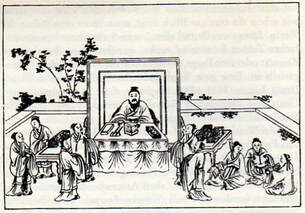
A haiku on Mother Earth
Even in anguish
Infected by industry
She embraces us
I am not the only music education scholar recognizing the need for a music education that addresses our globe’s greatest ecological crises. Though my philosophy is praxial, and it builds from and extends that tradition, some researchers are doing the same with the older aesthetic music education philosophy. I think this line of research may help praxial-minded music educators stay focused on ecological versions of ideas like beauty and cognition. While I fear most aesthetic approaches to musical ecology are not in fact ecological in any meaningful sense of the term—that is, they are ecologically destructive and narrow the term ecology to mean human environments, hence, not ecology—some work is being done that is genuinely ecological, and can be sustainable. These theorists place the making of music as an eco-aesthetic educational aim above the utilitarian manufacture of music in a capitalist society.
In a study published in Interdisciplinary Science Reviews, Minjian Guo, Hua Su and Lei Yue aim to transform the paradigm of aesthetic music education to overcome spiritual and ecological crises. Music teachers ought to notice consumer society in music education and reach toward “sustainable development” goals (the UN’s 4th Pillar). These researchers draw on Confucian values to construct their scholarship, (which is notable considering my previous posts looking at Victor Fung’s scholarship, Korean music, and Japanese musical ideas—including my ongoing use of haiku, which I consider the greatest artistic form created by humankind.)
According to this Confucian viewpoint, music is a part of heaven and earth. The researchers surveyed 468 U.S. music teachers and later built a framework around five components: society, ecological rationality, teachers, sustainable development, and ecology (this in response to the lack of ecology in American music education). The focus of aesthetic education has been on “listening, feeling, and appreciating,” (p. 565), and can be expanded to include “forming a new ecological environment for sustainable human development in harmony with nature” (p. 565). It is through art-forms that people experience and express beauty.
These researchers beginning with Confucian thought reinforces my ongoing claim that music educators MUST begin taking non-Western philosophies seriously. It’s not ONLY about appropriating non-Western musics for the Western classroom setting, but about seriously respecting, studying, and trying to understand the place-embedded, ecologically sustainable philosophies found in many specific cultures around the globe. It is no secret that aesthetic music education has been ecologically unsustainable, helping to foster a ecologically naïve citizenry.
As a praxial-minded educator, I observe that, traditionally, aesthetic approaches have drawn our field’s attention to classical music (which I teach at the university level) and Western-oriented ways of observing non-Western musics. The university system I teach in is the result of decades of aesthetic ideology, filtered up from the public school systems. If students truly wanted non-Western music classes rather than Western music, those classes would be full, rather than the ones I am hired to teach. By the time they reach university level, students have already been educated to value Western music in educational systems. Additionally, the focus of aesthetic music education, listening, feeling, and appreciating are, after all, observational modes of musicking. They are part of experiencing music, but not the whole of it.
Returning to my haiku from the start of this post. Mother Earth is an experienced, holistically musical being who embraces each of us. Music, including soundscapes, embrace us and hold us similarly. We spend so much time ignoring soundscapes that many of us don’t realize just how much the bird and the cicada, the wind and the thunderstorm educate us. Every day and night! The way forward for our field is a full realization of our ecological interconnectedness and responsibilities. These interconnected duties expand then to include our duties to other humans. In place, on soil, understanding our full embeddedness as peoples of Earth, we can lend each other a helping hand. Not as hollow. But as beings of Earth, sons and daughters of our Mother. I am grateful there are more and more music educators recognizing that fact.
DS
Link to image, Confucius and his Students: https://commons.wikimedia.org/w/index.php?search=confucius&title=Special%3ASearch&go=Go&ns0=1&ns6=1&ns12=1&ns14=1&ns100=1&ns106=1#/media/File:Confucius_and_his_students1.jpg
 RSS Feed
RSS Feed
